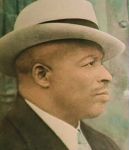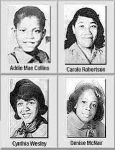For the Week of Sept. 10-16
September 10
1847—John Roy Lynch was born into slavery on this day near Vidalia, La. Lynch would be among the first group of Blacks to serve in the United States Congress after slavery. He represented the state of Mississippi. Lynch would even serve as temporary chairman of the Republican Party National Convention. During this period, the Republicans were the more progressive and friendly-to-Blacks party.
 |
| FATHER DIVINE
|
But as the period of Reconstruction faded and Southern politicians made it virtually impossible for Blacks to remain in political office, Lynch moved to Chicago and practiced law. He died in 1939 at the age of 92.
1965—Father Divine dies in Philadelphia. From about 1910 to his death in 1965, Father Divine was Black America’s foremost spiritual and cult leader. Indeed, he claimed to be God and his full self-given name was Rev. General Jealous Divine. Critics called him a charlatan and a religious scam artist. But initially as a traveling preacher and then from a base in New York City, Divine built his small church into the International Peace Mission—a large mass congregation with members and churches throughout the United States and several foreign countries. Little is known about his background but he was probably born in Georgia and his real given name was probably George Baker. During his heyday, Divine’s only serious competition was another Black spiritual-cult leader by the name of Daddy Grace.
1976—Mordecai Johnson, the first Black president of historic Howard University in Washington, D.C., dies. He was one of the nation’s foremost educational leaders. He was 86.
September 11
1740—Was he America’s first Black doctor and or dentist? It is unclear but on this day in 1740 the Philadelphia Gazette carried a report of a “Negro” named Simon who was skilled in the abilities to “bleed and draw teeth.” During the colonial period, such a phrase was normally used in reference to doctors and dentists.
1851—In a fairly unusual development, a group of Blacks on this day in 1851 routed a group of slave catchers who had come to Christiana, Pa., to re-capture run-away slaves. One White was killed and a second one seriously wounded.
September 12
1913—Track and field athletic legend Jesse Owens was born on this day in Oakville, Ala. Owens would achieve international fame winning four gold medals at the 1936 summer Olympic Games in Berlin, Germany. His feat helped undermine Adolph Hitler’s myth of Aryan or White superiority.
1977—One of the greatest unsung heroes of the struggle against then White-ruled South Africa’s system of racial suppression known as apartheid was murdered on this day by South African law enforcement officials. Steve Biko was a leader of the country’s Black Consciousness Movement. He believed that one of the most destructive attitudes undermining Black progress throughout the world was that Blacks were not truly proud to be Black.
1992—Dr. Mae Jemison became the first African-American woman in space when she was launched from the Kennedy Space Center on this day as part of a joint U.S.-Japanese mission. Since resigning from NASA, the multi-talented Jemison has started a company that aims to improve health care in Africa. In addition to her native English, Jemison speaks Russian, Japanese and the East African language of Swahili.
September 13
1663—The first documented slave rebellion in American is set to take place. The revolt in Gloucester County, Va., involved Black slaves and White indentured servants. However, it was betrayed by a White indentured servant.
1885—Alain L. Locke, philosopher and the first Black Rhodes scholar, is born. He became a professor at Howard University and one of Black America’s leading intellectual figures.
1962—In an event that demonstrated the tenacity of racism, especially in the South, Mississippi Gov. Ross Barnett pledged to defy the federal government and block the court ordered admission of a Black man—James Meredith—to the University of Mississippi. He made his declaration during a statewide television and radio address. Barnett said he would go to jail to prevent integration arguing, “There is no case in history where the Caucasian race has survived social integration.” Despite his talk, Barnett would eventually relent and Meredith (with the aid of U.S. Marshals) was allowed to attend the university.
1971—Approximately 1,500 state troopers were ordered by Gov. Nelson Rockefeller to storm New York’s Attica prison to breakup a takeover of the prison by Black inmates demanding better conditions. When the dust settled, the storming of the prison resulted in the deaths of 32 inmates and 10 guards who had been held hostage.
1996—Pioneering rapper Tupac Shakur dies from his wounds after being shot in Las Vegas, Nev. He was only 25. Shakur has now become a near cult figure among rappers. His killers were never brought to justice.
September 14
1940—Blacks are allowed for the first time to enter all branches of the U.S. military when President Franklin D. Roosevelt, on this day, signs the Selective Service Act.
September 15
1830—The First National Negro Convention took in Philadelphia, Pa. Top on the agenda were the better organizing of anti-slave activities and whether or not free Blacks should return to Africa.
1881—Inventor Jan E. Matzeilger was born in Dutch Guyana. He came to the United States in 1878 and by 1880 had patented a shoe lacing machine.
1889—One of Black America’s most outstanding poets, Claude McKay, is born. He would become a leading figure during the Black Cultural Revolution known as the Harlem Renaissance.
 |
|
16TH ST. CHURCH GIRLS
|
1963—In one of the most heartless terrorist attacks of the Civil Rights Movement, the 16th Street Baptist Church in Birmingham, Ala., was bombed by White supremacists and Ku Klux Klan members. Four little Black girls were killed. But instead of scaring African-Americans into backing away from their demands, the act actually inspired the Civil Rights Movement.
September 16
1848—The French abolish slavery in all their territories. It would take a civil war and another 17 years before slavery is abolished in America.
1925—Blues great B.B. King is born on this day in Itta Benna, Miss.
1933—“Emperor Jones” is released on this day by United Artists. It starred social activist Paul Robeson as Brutus Jones. It was the first Hollywood film with a Black leading man and a White supporting cast.
(This Week in Black History is compiled by Robert Taylor. He welcomes comments and additions. You can also have a free edition of his popular “Black History Journal” e-mailed to you by contacting him at TaylorMediaPrime@yahoo.com or by leaving your e-mail address at 202-657-8872.)